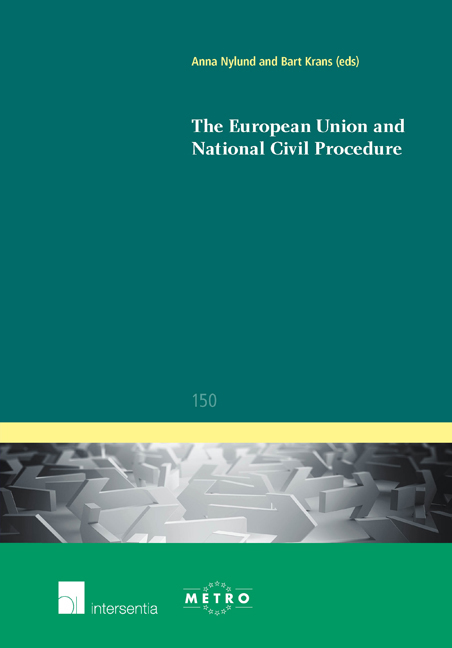Book contents
- Frontmatter
- Contents
- About the Authors
- List of Abbreviations
- The European Union and National Civil Procedure – A Rocky Road or a Smooth Process?
- Some European Challenges for Belgian Civil Procedure
- Danish Civil Procedure and the Internal Market: Impact and Challenges of Sectoral Harmonisation
- European Influences upon English Civil Justice: Tempests or Gentle Breezes?
- European Union and National Civil Procedure: The French Paradox
- The European Union and Civil Procedure from a German Perspective
- Interaction between European Law and Hungarian Civil Procedure Law
- The Impact of EU Law on Dutch Civil Procedure Law
- Norway: An Insider Outside – or an Outsider Inside – European Civil Justice
- Polish Civil Proceedings: How Much Europeanised?
- Slovenian Civil Procedure and the Transformative Power of the EU
- The Curious Incident of the Dog in the Night-Time: Europeanisation of Civil Procedure in Sweden
- Conclusions and Outlook
- Index
- Miscellaneous Endmatter
Norway: An Insider Outside – or an Outsider Inside – European Civil Justice
Published online by Cambridge University Press: 19 December 2017
- Frontmatter
- Contents
- About the Authors
- List of Abbreviations
- The European Union and National Civil Procedure – A Rocky Road or a Smooth Process?
- Some European Challenges for Belgian Civil Procedure
- Danish Civil Procedure and the Internal Market: Impact and Challenges of Sectoral Harmonisation
- European Influences upon English Civil Justice: Tempests or Gentle Breezes?
- European Union and National Civil Procedure: The French Paradox
- The European Union and Civil Procedure from a German Perspective
- Interaction between European Law and Hungarian Civil Procedure Law
- The Impact of EU Law on Dutch Civil Procedure Law
- Norway: An Insider Outside – or an Outsider Inside – European Civil Justice
- Polish Civil Proceedings: How Much Europeanised?
- Slovenian Civil Procedure and the Transformative Power of the EU
- The Curious Incident of the Dog in the Night-Time: Europeanisation of Civil Procedure in Sweden
- Conclusions and Outlook
- Index
- Miscellaneous Endmatter
Summary
The EU, the EEA Agreement and Norwegian Law
Norway has stood on the doorsteps of the European Union (then the European Communities (EC)) for more than four decades. In 1960, Norway became one of the seven original members of the European Free Trade Association (EFTA), a trade-blocalternative to the European Economic Community (EEC). The Norwegian people voted against EC-membership in 1972 and 1994. In the late 1980's, a plan to create a single market including both EC and EFTA member states was launched. It resulted in the agreement on the European Economic Area (EEA), which extends the single market and the free movement of goods, persons, services and capital to non-EU EEA member states. Since 1995, EEA has only three member states: Iceland, Liechtenstein and Norway.
The EEA Agreement is limited in scope: It does not include inter alia justice and home affairs. For EU legislation to become EEA law, the EEA Joint Committee must unanimously agree on including it to the EEA agreement. The EEA has its own institutions, including the EFTA Court, which has a similar function as the European Court of Justice. National courts in the EEA states can request advisory opinions on the interpretation of the EEA Agreement. The goal of the EEA is homogeneity and effectiveness, meaning equal and effective application of law in the EEA region. Effective application of substantive law often requires changes in the civil justice system.
Despite being outside EU, Norway participates in some aspects of judicial cooperation. It is a party of the Lugano Convention on jurisdiction and recognition and enforcement judgments in civil and commercial matters of 1988, revised in 2007, and the Schengen Agreement. To enlarge judicial cooperation, the Norwegian government seeks to establish a parallel convention to the regulation on service of documents and the regulation on taking of evidence. The Norwegian civil procedure system is consequently far from unaffected by European law.
Norway, as a rule, rejects EEA relevance of EU legislation based on article 81 TFEU, judicial cooperation in civil matters. As a principle, Norway also rejects legislation based on article 114 TFEU on approximation of laws to ensure the functioning of the internal market, if the content is primarily procedural.
- Type
- Chapter
- Information
- The European Union and National Civil Procedure , pp. 101 - 114Publisher: IntersentiaPrint publication year: 2016
- 2
- Cited by



